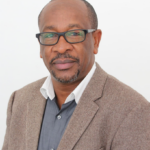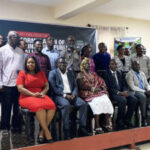VANCOUVER, Canada — April 25th, 2024 – In a stirring address at TED2024, Prof. Abdoulaye Diabaté, Head of Medical Entomology and Parasitology at the Research Institute in Health Sciences in Bobo-Dioulasso, Burkina Faso, and Principal Investigator of Target Malaria Burkina Faso, shared his journey with malaria and his resolute commitment to eradicating it. Prof. Diabaté’s talk shed light on the devastating toll of malaria, particularly in Africa, and stressed the urgent need for transformative solutions.

“Malaria is tightly linked to poverty, and it is incredibly expensive to be poor,” Prof. Diabaté said as he reflected on his childhood battle with the disease. “Two hundred million cases worldwide end up sadly every year with approximately 600 000 deaths. While this is a statistic to many, to me there is a personal, tragic story. Most of these deaths happen in Africa where children and pregnant women pay the highest price.”
Prof. Diabaté’s firsthand experience highlights the profound impact of malaria on individuals and families, motivating his tireless efforts to end malaria in his lifetime.
Target Malaria is an international research consortium of scientists, stakeholder engagement teams, risk assessment specialists, and communication and regulatory experts from Africa, North America and Europe, dedicated to eradicating malaria. As the Principal Investigator of Target Malaria in Burkina Faso, Prof. Diabaté highlighted the consortium’s collaborative efforts across countries severely affected by malaria in Africa and their partners in the US, UK, and Italy. He emphasised the potential of gene drive technology to revolutionise malaria control, offering a sustainable and cost-effective approach to combating the disease.
Acknowledging the challenges and scepticism surrounding gene drive technology, particularly in Africa, Prof Diabaté highlighted Target Malaria’s commitment to transparent stakeholder engagement and capacity building, empowering African scientists to lead the fight against malaria.
Target Malaria prioritises public involvement throughout the research process, ensuring that community members play an active role in shaping research design, implementation, and outcomes. The consortium prioritises the invaluable perspectives that the communities, and their leaders, bring to the table. “We do not separate research from society. A large part of our work involves fostering meaningful collaboration every step of the way. These are the people most affected by the disease and their opinions are imperative to the success of our work,” he adds.
The stakeholder engagement strategy involves social scientists, communications experts, and engagement practitioners dedicated to fostering dialogue across all levels of stakeholders. “Drawing from these insights, we tailor a range of communication tools to effectively convey information about our project and malaria prevention methods. Our approach ensures that information is accessible and relevant to each audience, fostering informed decision-making and collaborative action towards our shared goal of malaria eradication” he said.
Reflecting on his experience at TED2024 and on World Malaria Day (April 25), Prof. Diabaté expressed gratitude for the recognition of his work on the world stage. “Being at TED has been an energizing experience. It’s a testament to the importance of our collective efforts to use human ingenuity to end malaria and improve global health.”

Even more poignant was his commitment to contributing to an Africa free of malaria. Prof Diabaté’s address put the skills and expertise of African science on the world stage. His vision offers a beacon of hope and his address ignited conversations, inspiring support for Target Malaria’s gene drive technology and for supporting the development of a new generation of African scientists.

Visit TED2024 for more updates and join the conversation on social media using #TED2024.
For media inquiries or interview requests, please contact:
African Media Agency
Eric Segbo
email es@africanmediaagency.com
About gene drive:
Target Malaria is adapting a natural genetic mechanism called gene drive, to spread a genetic modification in malaria mosquitoes that would affect the mosquitoes’ ability to reproduce. Gene drive biases the rate of inheritance of certain genes so they are passed on to all offspring from one generation to another. The objective is to impact mosquito reproductive ability and therefore stop malaria transmission. Gene drive technologies hold the promise of being a self-sustaining and cost-effective complementary method to eliminate malaria in Africa. The team in Burkina has been doing contained use studies on the male bias strain (genetically modified to be mostly male offspring, no gene drive).
About Target Malaria:
Target Malaria is a not-for-profit research consortium that aims to develop and share new, cost-effective and sustainable genetic technologies to modify mosquitoes and reduce malaria transmission. Our vision is to contribute to a world free of malaria. We aim to achieve excellence in all areas of our work, creating a path for responsible research and development of genetic technologies, such as gene drive. www.targetmalaria.org
Target Malaria receives core funding by the Bill & Melinda Gates Foundation and Open Philanthropy. The lead grantee organisation is Imperial College London with partners in Africa, Europe and North America.
Follow Target Malaria on X, LinkedIn and YouTube.
About TED
TED is a nonprofit, nonpartisan organization dedicated to discovering, debating and spreading ideas that spark conversation, deepen understanding and drive meaningful change. Our organization is devoted to curiosity, reason, wonder and the pursuit of knowledge — without an agenda. We welcome people from every discipline and culture who seek a deeper understanding of the world and connection with others, and we invite everyone to engage with ideas and activate them in your community.
TED began in 1984 as a conference where Technology, Entertainment and Design converged, but today it spans a multitude of worldwide communities and initiatives exploring everything from science and business to education, arts and global issues. In addition to the TED Talks curated from our annual conferences and published on TED.com, we produce original podcasts, short video series, animated educational lessons (TED-Ed) and TV programs that are translated into more than 100 languages and distributed via partnerships around the world. Each year, thousands of independently run TEDx events bring people together to share ideas and bridge divides in communities on every continent. Through the Audacious Project, TED has helped catalyze more than $3 billion in funding for projects that seek to make the world more beautiful, sustainable and just. In 2020, TED launched Countdown, an initiative to accelerate solutions to the climate crisis and mobilize a movement for a net-zero future, and in 2023 TED launched TED Democracy to spark a new kind of conversation focused on realistic pathways towards a more vibrant and equitable future. View a full list of TED’s many programs and initiatives.Follow TED on Facebook, Instagram, LinkedIn, TikTok, and X
The post How expensive it is to be poor Prof. Abdoulaye Diabaté inspires global action against malaria at TED2024 appeared first on African Media Agency.






